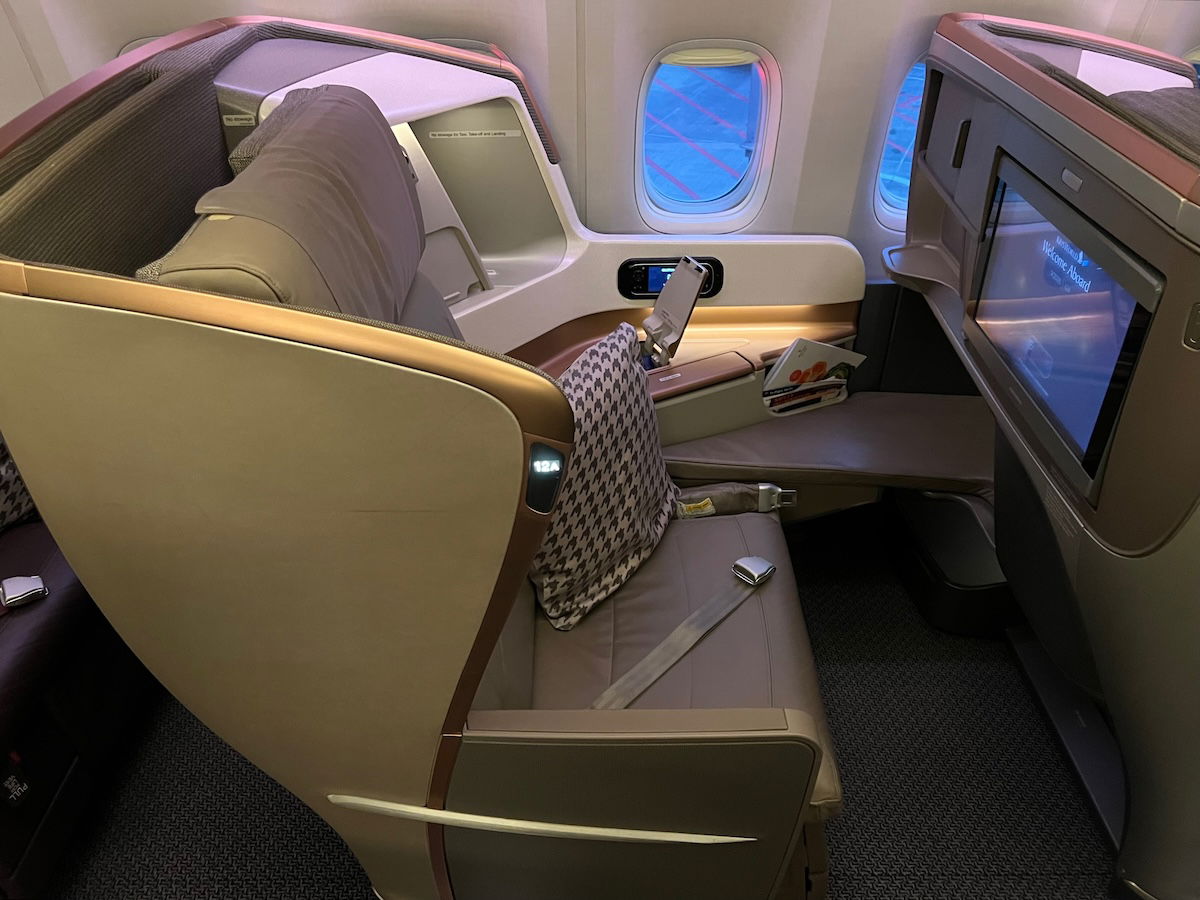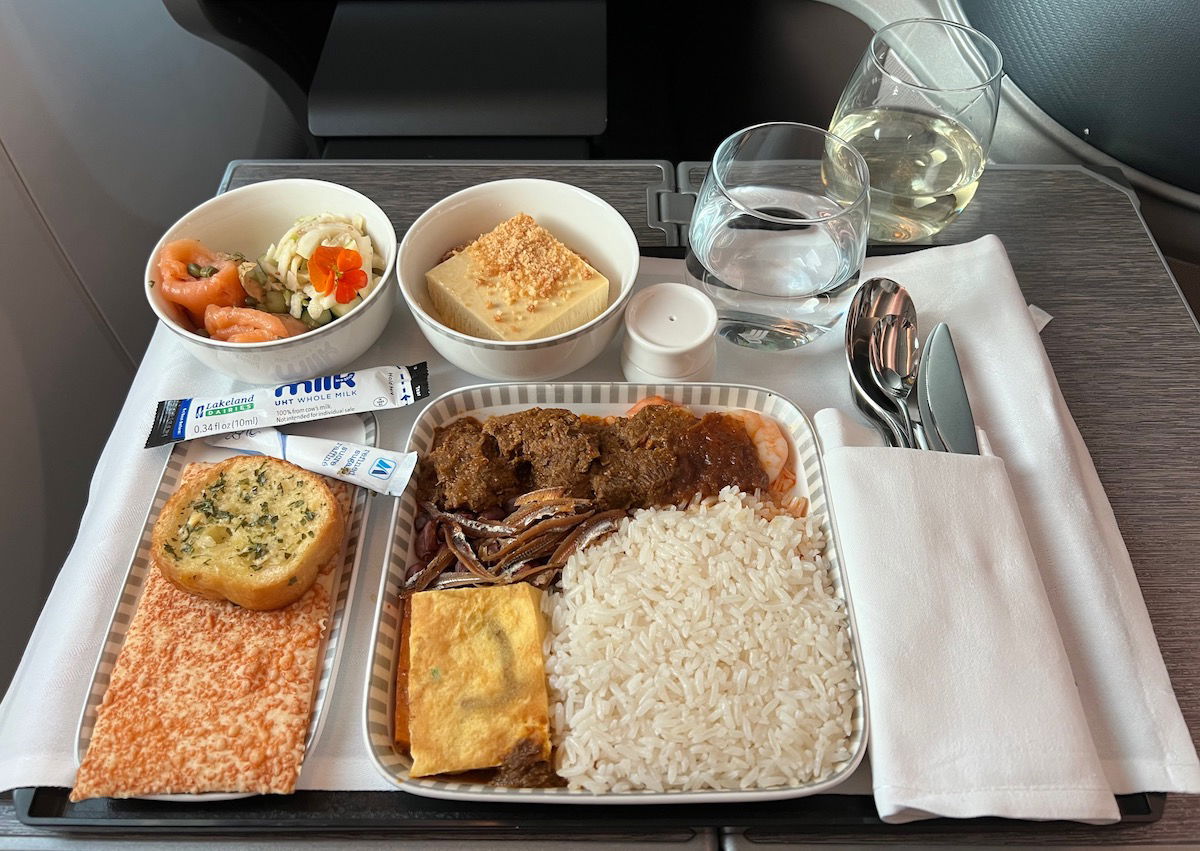A Muslim Singapore Airlines business class passenger is accusing the airline of a “deep personal and spiritual violation,” after he was served pork onboard a flight, despite trying to confirm the contents of the meal with the crew. The question is, what should the carrier’s liability be in a situation like this?
Singapore Airlines passenger discovers that “prosciutto” is pork
This incident happened on July 7, 2025, on Singapore Airlines flight SQ24 from Singapore (SIN) to New York (JFK). A Muslim Singapore permanent resident traveling in business class was served an appetizer after takeoff, labeled as “grilled Mediterranean salad with prosciutto.” He was unfamiliar with the term “prosciutto,” so he asked the crew if it contained bacon or pork.
According to his version of what happened, he was assured by two flight attendants that it was not in fact pork. Based on that assurance, he began eating the meal, though became troubled by the taste and texture. So he later researched the term, and was shocked to discover that prosciutto is in fact pork.
As a practicing Muslim of over 30 years, he was “in complete shock,” and the experience constituted a “deep personal and spiritual violation.” He reached out to Singapore Airlines customer relations after the flight, and they confirmed that the crew was “initially uncertain whether the prosciutto was pork,” but offered him alternatives after the mistake was realized.
The crew reportedly suggested that he may not have been heard clearly when asking about the dish’s content, which he describes as “dismissive,” stating it compounds his sense of distress.
Singapore Airlines advises passengers with special dietary needs to pre-select their meals. This particular passenger highlighted how he ordered a Muslim meal for one of the meal services, but not for the lunch service, for which he selected something from the “Book the Cook” program.
The airline initially offered him a voucher worth S$150, which he described as “saddening and insulting.” The airline later increased the offer to 15,000 KrisFlyer miles, and then 30,000 KrisFlyer miles.
The traveler has rejected all those offers, claiming that “no person of faith — Muslim, Jew, Hindu, or otherwise — would ever willingly break a sacred dietary law in exchange for 30,000 miles.” He also stated that “this was not a case of a simple service failure,” and that this “led to the first violation of [his] religious dietary practice in 30 years.”
In response to this incident, Singapore Airlines has issued the following statement:
Singapore Airlines (SIA) deeply regrets that a customer on flight SQ24 from Singapore to New York on 7 July 2025 was served an appetiser that contained pork. We sincerely apologise to the affected customer for the distress this has caused.
When our cabin crew members became aware that the customer does not consume pork, they immediately apologised, removed the dish, and offered an alternative. Following the incident, we have strengthened our cabin crew training and service procedures, with particular emphasis on ingredient awareness and clear communications with customers regarding food contents.
SIA remains in direct contact with the affected customer regarding this incident. SIA is deeply committed to respecting the diverse religious and cultural backgrounds of all our customers. We advise customers with special dietary requirements, including religious needs, to pre-book their special meals for all meal services before their flights.

My take on this dietary restriction violation
Big picture, there’s probably a lesson to be learned here in terms of Singapore Airlines adding labels to its menus that show the contents of a particular dish. In fairness, most airlines don’t have these kinds of indicators on menus, so Singapore Airlines is hardly alone in that regard.
The crew should’ve probably done a better job in terms of giving the passenger correct information, though it also sounds like there might have been a miscommunication, with the crew claiming that his question may not have been heard clearly.
I think it’s reasonable for Singapore Airlines to provide some gesture of goodwill for the misunderstanding, as the airline did. However, personally I take issue with passengers in these kinds of situations essentially claiming this was a life changing event, and that they should be compensated accordingly (as is the case here, since the guy refused 30,000 KrisFlyer miles, and expects a lot more).
If a dietary restriction is truly life changing for you in terms of the religious impact, I think it’s also important to do everything in your power to prevent something like this from happening:
- The man chose not to order a special meal when he could have, which would have assured he didn’t get served pork
- The man ended up researching what prosciutto was after the meal, but if he was so uncertain that he asked the crew twice, maybe he should’ve also researched it before eating it, since clearly he was skeptical (Singapore Airlines business class passengers get free Wi-Fi)
So yeah, the crew should try to give him the right information. But I also think it’s not fair to turn something that amounts to a basic misunderstanding into a situation where he feels that the crew violated him in an unforgivable way. It’s not fair to shift that kind of a burden onto those in the service industry, in my opinion.
I don’t eat pork — not for religious reasons, but more for personal ethical reasons — and I get frustrated when I’m served pork despite specifically asking not to receive it. However, I just get mildly frustrated, and ultimately I try not to make it other peoples’ problem, because the world doesn’t revolve around me. At least that’s my take.

Bottom line
A Singapore Airlines business class passenger is furious, after he was served a “prosciutto” dish, which he later discovered contained pork. In fairness, he asked the crew about this, and they reportedly informed him that the dish didn’t have pork, or there was some misunderstanding.
The airline has apologized, has promised to learn from the incident, and has offered him a gesture of goodwill, but clearly he wants more, as he states this led to the first violation of his religious dietary practice in 30 years.
What do you make of this incident, and what kind of liability do you think the airline should have?







